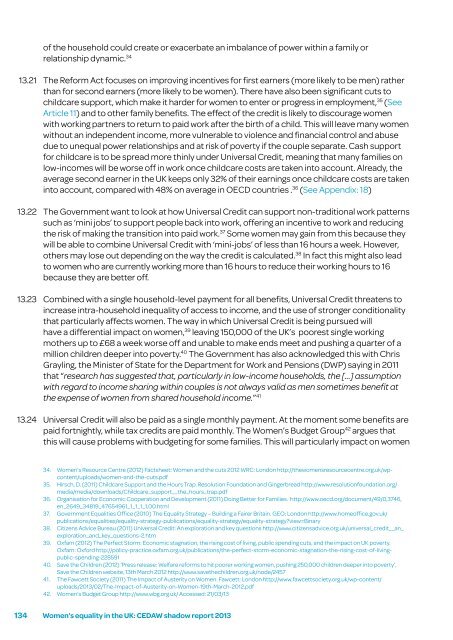Women’s equality in the UK – A health check
Women’s equality in the UK – A health check
Women’s equality in the UK – A health check
Create successful ePaper yourself
Turn your PDF publications into a flip-book with our unique Google optimized e-Paper software.
13.21<br />
13.22<br />
13.23<br />
13.24<br />
of <strong>the</strong> household could create or exacerbate an imbalance of power with<strong>in</strong> a family or<br />
relationship dynamic. 34<br />
The Reform Act focuses on improv<strong>in</strong>g <strong>in</strong>centives for first earners (more likely to be men) ra<strong>the</strong>r<br />
than for second earners (more likely to be women). There have also been significant cuts to<br />
childcare support, which make it harder for women to enter or progress <strong>in</strong> employment, 35 (See<br />
Article 11) and to o<strong>the</strong>r family benefits. The effect of <strong>the</strong> credit is likely to discourage women<br />
with work<strong>in</strong>g partners to return to paid work after <strong>the</strong> birth of a child. This will leave many women<br />
without an <strong>in</strong>dependent <strong>in</strong>come, more vulnerable to violence and f<strong>in</strong>ancial control and abuse<br />
due to unequal power relationships and at risk of poverty if <strong>the</strong> couple separate. Cash support<br />
for childcare is to be spread more th<strong>in</strong>ly under Universal Credit, mean<strong>in</strong>g that many families on<br />
low-<strong>in</strong>comes will be worse off <strong>in</strong> work once childcare costs are taken <strong>in</strong>to account. Already, <strong>the</strong><br />
average second earner <strong>in</strong> <strong>the</strong> <strong>UK</strong> keeps only 32% of <strong>the</strong>ir earn<strong>in</strong>gs once childcare costs are taken<br />
<strong>in</strong>to account, compared with 48% on average <strong>in</strong> OECD countries . 36 (See Appendix: 18)<br />
The Government want to look at how Universal Credit can support non-traditional work patterns<br />
such as ‘m<strong>in</strong>i jobs’ to support people back <strong>in</strong>to work, offer<strong>in</strong>g an <strong>in</strong>centive to work and reduc<strong>in</strong>g<br />
<strong>the</strong> risk of mak<strong>in</strong>g <strong>the</strong> transition <strong>in</strong>to paid work. 37 Some women may ga<strong>in</strong> from this because <strong>the</strong>y<br />
will be able to comb<strong>in</strong>e Universal Credit with ‘m<strong>in</strong>i-jobs’ of less than 16 hours a week. However,<br />
o<strong>the</strong>rs may lose out depend<strong>in</strong>g on <strong>the</strong> way <strong>the</strong> credit is calculated. 38 In fact this might also lead<br />
to women who are currently work<strong>in</strong>g more than 16 hours to reduce <strong>the</strong>ir work<strong>in</strong>g hours to 16<br />
because <strong>the</strong>y are better off.<br />
Comb<strong>in</strong>ed with a s<strong>in</strong>gle household-level payment for all benefits, Universal Credit threatens to<br />
<strong>in</strong>crease <strong>in</strong>tra-household <strong>in</strong><strong>equality</strong> of access to <strong>in</strong>come, and <strong>the</strong> use of stronger conditionality<br />
that particularly affects women. The way <strong>in</strong> which Universal Credit is be<strong>in</strong>g pursued will<br />
have a differential impact on women, 39 leav<strong>in</strong>g 150,000 of <strong>the</strong> <strong>UK</strong>’s poorest s<strong>in</strong>gle work<strong>in</strong>g<br />
mo<strong>the</strong>rs up to £68 a week worse off and unable to make ends meet and push<strong>in</strong>g a quarter of a<br />
million children deeper <strong>in</strong>to poverty. 40 The Government has also acknowledged this with Chris<br />
Grayl<strong>in</strong>g, <strong>the</strong> M<strong>in</strong>ister of State for <strong>the</strong> Department for Work and Pensions (DWP) say<strong>in</strong>g <strong>in</strong> 2011<br />
that “research has suggested that, particularly <strong>in</strong> low-<strong>in</strong>come households, <strong>the</strong> [...] assumption<br />
with regard to <strong>in</strong>come shar<strong>in</strong>g with<strong>in</strong> couples is not always valid as men sometimes benefit at<br />
<strong>the</strong> expense of women from shared household <strong>in</strong>come.” 41<br />
Universal Credit will also be paid as a s<strong>in</strong>gle monthly payment. At <strong>the</strong> moment some benefits are<br />
paid fortnightly, while tax credits are paid monthly. The <strong>Women’s</strong> Budget Group 42 argues that<br />
this will cause problems with budget<strong>in</strong>g for some families. This will particularly impact on women<br />
34. <strong>Women’s</strong> Resource Centre (2012) Factsheet: Women and <strong>the</strong> cuts 2012 WRC: London http://<strong>the</strong>womensresourcecentre.org.uk/wpcontent/uploads/women-and-<strong>the</strong>-cuts.pdf<br />
35. Hirsch, D. (2011) Childcare Support and <strong>the</strong> Hours Trap. Resolution Foundation and G<strong>in</strong>gerbread http://www.resolutionfoundation.org/<br />
media/media/downloads/Childcare_support__<strong>the</strong>_hours_trap.pdf<br />
36. Organisation for Economic Cooperation and Development (2011) Do<strong>in</strong>g Better for Families. http://www.oecd.org/document/49/0,3746,<br />
en_2649_34819_47654961_1_1_1_1,00.html<br />
37. Government Equalities Office (2010) The Equality Strategy <strong>–</strong> Build<strong>in</strong>g a Fairer Brita<strong>in</strong>. GEO: London http://www.homeoffice.gov.uk/<br />
publications/equalities/<strong>equality</strong>-strategy-publications/<strong>equality</strong>-strategy/<strong>equality</strong>-strategy?view=B<strong>in</strong>ary<br />
38. Citizens Advice Bureau (2011) Universal Credit: An exploration and key questions http://www.citizensadvice.org.uk/universal_credit__an_<br />
exploration_and_key_questions-2.htm<br />
39. Oxfam (2012) The Perfect Storm: Economic stagnation, <strong>the</strong> ris<strong>in</strong>g cost of liv<strong>in</strong>g, public spend<strong>in</strong>g cuts, and <strong>the</strong> impact on <strong>UK</strong> poverty.<br />
Oxfam: Oxford http://policy-practice.oxfam.org.uk/publications/<strong>the</strong>-perfect-storm-economic-stagnation-<strong>the</strong>-ris<strong>in</strong>g-cost-of-liv<strong>in</strong>gpublic-spend<strong>in</strong>g-228591<br />
40. Save <strong>the</strong> Children (2012) ‘Press release: Welfare reforms to hit poorer work<strong>in</strong>g women, push<strong>in</strong>g 250,000 children deeper <strong>in</strong>to poverty’,<br />
Save <strong>the</strong> Children website, 13th March 2012 http://www.save<strong>the</strong>children.org.uk/node/2457<br />
41. The Fawcett Society (2011) The Impact of Austerity on Women. Fawcett: London http://www.fawcettsociety.org.uk/wp-content/<br />
uploads/2013/02/The-Impact-of-Austerity-on-Women-19th-March-2012.pdf<br />
42. <strong>Women’s</strong> Budget Group http://www.wbg.org.uk/ Accessed: 21/03/13<br />
134 <strong>Women’s</strong> <strong>equality</strong> <strong>in</strong> <strong>the</strong> <strong>UK</strong>: CEDAW shadow report 2013


